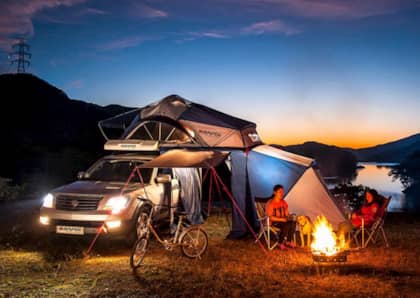Pups on the Trail: 8 Tips for Safely Off-Roading, Camping, and Overlanding with Dogs
Do you have a furry friend who you’d like to take with you on your off-roading and camping adventures? If so, then you may be wondering how to make the experience safe and enjoyable for both you and your dog. Here are 8 great tips and tricks for off-roading and camping with your dog.

1. Doggo Fitness
Before taking your dog off-roading or camping, it is important to ensure that they are physically fit for the journey. This means checking with your veterinarian to make sure that your dog is up to date on all their vaccinations, is free of any health issues that could cause problems during the trip and is able to handle the physical demands of being away from a protected environment. If your dog has any medical conditions, it is important to remember to pack their medication with you.

2. Prepare Your Pup for the Elements
Being prepared for all types of weather includes appropriate gear for your dog, such as a waterproof coat, warm blanket, and paw protection, in the event of rain, snow, or extreme temperatures. Additionally, it's a good idea to have a weatherproof car seat cover or blanket to protect your car's interior from dirt, mud, and water that your dog may bring into the vehicle. You should also bring plenty of water and food for your dog, as well as a first-aid kit.

3. Dog Approved Vehicle
Choose a vehicle that is suitable for both you and your pets. The vehicle should have enough space for your dog to move around comfortably and be secured in place with a harness or crate. You should also make sure that the vehicle has enough ventilation and air conditioning to keep your dog comfortable during the trip.

4. Off-Road Training
Take the time to train your dog to become familiar with the vehicle and the equipment you will be using well before the trip. Make sure that your dog is comfortable with your camping gear, such as tents, sleeping bags, and cooking equipment. It’s also a good idea to teach your dog to obey basic commands, such as "come," "stay," and "heel," in case of emergency situations.

5. Respect Wildlife and Other Campers
At certain times, you might have to keep your dog on a leash or in a secured area to prevent them from disturbing other campers or wildlife. Always clean up after yourself and your dog and dispose of their waste properly to avoid contaminating the environment.

6. Don’t Skimp on Water, Food or Treats
Bring plenty of water for your dog to drink with plenty of extra water bottles just in case. Bring enough food for your dog's meals and bring some extra just in case of an unexpected change of plans or delays. Bringing treats also helps reinforce positive actions made by your furry friend and can be one way to let them know they are doing a great job. It also is very useful for situations where they might be distracted and will help keep their attention on you.

7. Bring a Leash
While many people off-leash their dogs when outdoors, it's still important to have a leash handy in case of unsure surroundings or people. This way, you can keep your dog safe and prevent them from running off after something or someone. It's always better to be safe than sorry, especially when it comes to your furry friend's safety.

8. Consider Snake Training for Your Dog
During the warmer months when snakes are more active it might be wise to get your pup trained in case they encounter a snake during your adventures. Snakes often sunbathe on sunny trails and a dog may not know to steer clear of a venomous reptile—especially if the dog often runs out of eyesight of their owner. Snake training could be a lifesaver for your dog if you are in places that are heavily populated with snakes.












